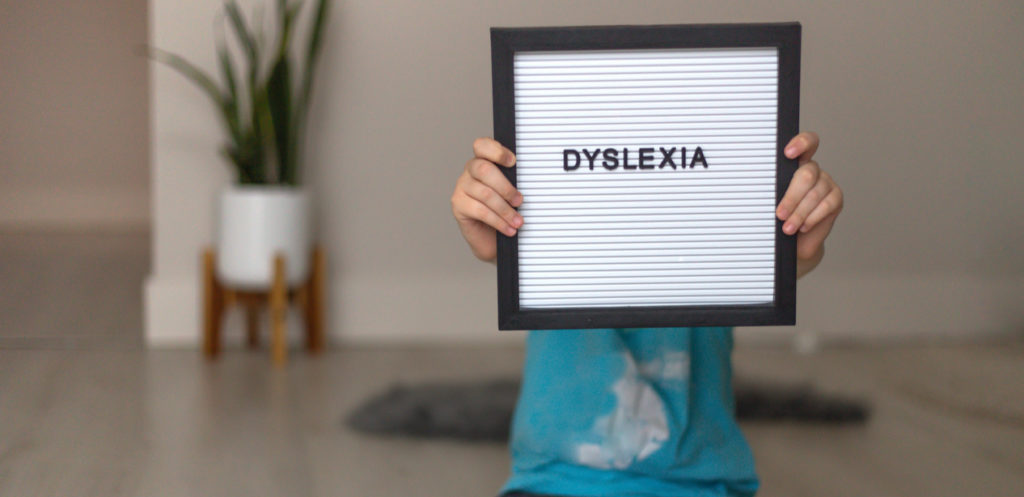The term Dyslexia has crossed most of us at some point in our lives. But not everyone knows what it actually is. Is it an organic disease, or just a nonorganic disorder? Does it happen to children alone or adults as well? And most importantly, how can we deal with a dyslexic child?
What is Dyslexia?
Dyslexia is a learning disorder where the brain cannot comprehend words or letters while reading. Dyslexic children have a hard time reading because it is very difficult for them to identify speech sounds and learn how they relate to letters and words.
In addition, it is usually referred to as a “hidden handicap”. That is because dyslexic children can actually be smarter than most. It does not influence their creativity directly. In fact, some dyslexic children are very creative in other fields like sports or arts.
Is it the same as reading difficulties?
Late learners or readers and dyslexic children share the same difficulties when it comes to reading. However, there are a few major differences between the two. Much research out there shows the difference between them. We can sum them up into three main differences:
- 1| Dyslexia is more common amongst males.
- 2| Neurological disabilities are more common for late readers.
- 3| late readers can spell and attempt to read better than others.
On the other hand, there are clear physiological differences between the two. Dyslexic children have a neurological dysfunction in their posterior left hemisphere (the left side of the brain). This is rarely found for late readers or learners.
Dyslexia symptoms
You can spot if your child is dyslexic from certain signs and symptoms throughout different age groups.
Preschoolers
- – Late talking.
- – Difficulty learning new words.
- – Unable to form words or short simple sentences.
- – Difficulty remembering words or names.
- – Unable to learn or play nursery rhymes.
During school years
- – Slow or late readers compared to their peers.
- – Difficulties understanding what they are listening to.
- – Problems forming answers or words.
- – Unable to follow classroom sequence.
- – Hardship in differentiating between words or sounds.
- – Inability to pronounce or spell ew words.
- – Taking a long time in completing tasks that involve reading or writing.
Teenagers
- – Difficulties reading, especially aloud.
- – Mispronouncing words and names.
- – Trouble understanding idioms or jokes.
- – Inability to summarize stories long or short.
- – Trouble learning a new language.
- – Difficulties in doing math and memorizing texts.
- Do I need to see a doctor?
Many experts recommend mums to see doctors immediately if they detect a sign of dyslexia. Also, visit a doctor if your child’s reading level is below what’s expected. Treatment must begin as early as possible. If dyslexia was not treated at an early age, it will continue into adulthood.
Can it be cured?
Once your child is diagnosed, the doctor or specialist will start a treatment plan. This plan will include both you, your spouse, school, and teachers. Dyslexic children do need plenty of support and aid throughout this journey to overcome it easily.
This treatment plan is based on what caused this condition. If the causes are psychological, then a psychiatrist needs to be involved. On the other hand, the causes can be purely educational. If so, the plan should reevaluate the teaching methods and approaches. And that is why most plans fully include teachers and school.
How to support a dyslexic child?
If your child is diagnosed, you will want to support him or her to the fullest. You need to provide the best of the best when it comes to surroundings and treatment plans. Here is how you can support a dyslexic child:
1| Constantly communicate with school and teachers.
It is very important to keep your child’s school and teachers involved. This includes school consultants and speech therapists. Make sure they do all the necessary evaluation for your kid in order to follow up the progress. We believe that parents, school board, teachers, and specialists should all be a part of supporting dyslexic children.
2| Try using new technologies and electronics.
There are many applications on smartphones or tablets that support dyslexic children. You can ask teachers to use such apps within the classroom to help your child’s academic progress.
3| Follow up with your child’s progress.
Keep asking for daily updates on your child’s progress in school from teachers. You can do so via a notebook that goes back and forth between teachers and parents. Or you can reach out to them through WhatsApp or email if they don’t mind. This follow up will help you watch your child’s progress and determine if the treatment plan is working correctly.
4| Encourage them to read.
Just because they have difficulties reading, does not mean they should not. Sign them up for book clubs or reading clubs. Ask for reading assignments from teachers. And most importantly, sit down with your child daily for a bit of light reading.
5| Keep an eye out for bullies.
Children who are struggling with learning disabilities are most likely to get bullied. That is why we suggest you keep an eye on your child. And keep a daily conversation going to make sure all is well.






